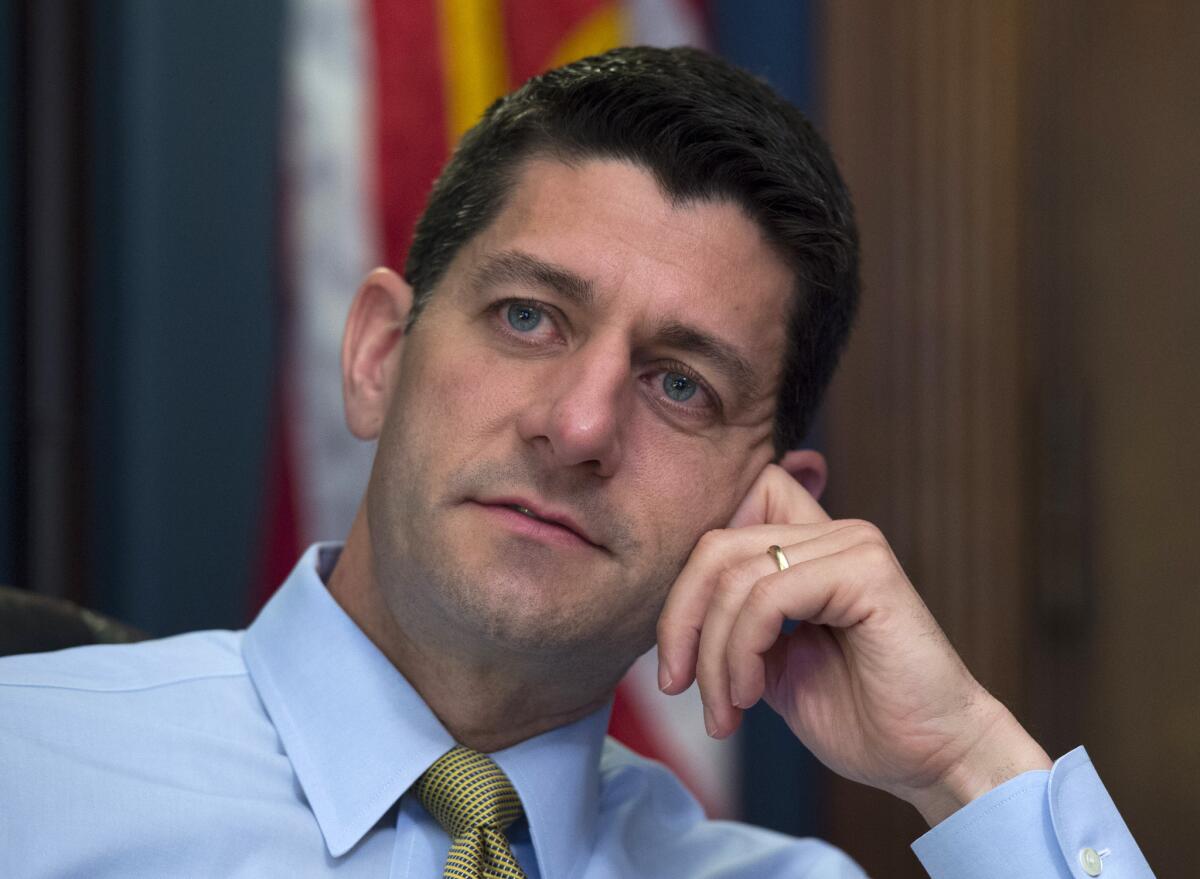Paul Ryan says Republicans have until Friday to unify behind him for House speaker

Rep. Paul Ryan (R-Wis.), a former vice presidential nominee, is considered the GOP’s best hope to become speaker of House.
- Share via
Reporting from Washington — Rep. Paul D. Ryan (R-Wis.) told his anxious colleagues Tuesday night that he would agree to run for speaker of the House, but only if the party united behind him by Friday.
“Our next speaker has to be a visionary one,” Ryan said after a meeting with House Republicans. “If I can truly be a unifying figure, then I will gladly serve.”
The statement could bring a possible resolution to the GOP leadership struggle that has threatened to further divide the party, but it remains unclear whether conservatives will support Ryan.
House Republicans have been in a stalemate after Speaker John A. Boehner announced he would step down and a conservative faction led by the House Freedom Caucus blocked the rise of Majority Leader Kevin McCarthy of California.
Ryan, a former vice presidential nominee, is considered the Republican Party’s best hope for uniting its divided House majority. But he had expressed reluctance at taking the difficult job without unanimous support.
House Republicans returned to Washington late Tuesday evening and almost immediately gathered behind closed doors over a meal of Chick-fil-A in the Capitol basement to assess the situation after a recess week away.
At that meeting, Ryan said he would be “willing to serve” if the three main GOP caucuses united around him. He also had other conditions, including that he not be required to travel as much as Boehner had so Ryan could spend time with his family.
“We have white smoke,” said Rep. Steve Womack (R-Ark.) as he left the closed meeting.
“He really laid out a vision ... selling conservatism,” said Rep. Marlin Stutzman (R-Ind.), a member of the House Freedom Caucus. Stutzman had previously backed another candidate for speaker but said he was impressed by Ryan’s approach and effort to unify the majority. “Paul Ryan was very clear it’s going to be all or nothing.”
Rep. Jason Chaffetz (R-Utah), who had announced he would run for speaker, said Tuesday he was withdrawing from the race to back Ryan.
SIGN UP for the free Essential Politics newsletter >>
Ryan, who is said to be considering a future run for the presidency, was under tremendous pressure to take the job.
“My greatest worry is the consequence of not stepping up,” he said. “Our country is in desperate need of a leader.”
For more than a week, Ryan had been in a political standoff with the Freedom Caucus, a core block of conservatives who wanted changes to House rules in exchange for their support.
The caucus has enough votes to block Ryan from reaching the speaker’s gavel. But he has refused to yield to its demands to loosen control over legislative proceedings.
Ryan had met earlier in the day with a handful of members of the caucus, and he later told his colleagues that any rule changes “must be made as a team.” One of his conditions, though, is that lawmakers no longer threaten to oust the speaker with a “vacate the chair” motion — as they did with Boehner.
“No matter who is speaker, they cannot be successful with this weapon pointed at them all the time,” said Ryan’s spokesman, Brendan Buck.
The leadership drama has taken a toll on Americans’ views of the GOP majority in Congress, according to new polling.
Six in 10 Americans see the leadership battle as a “sign of dysfunction” among House Republicans, and 29% see it as a “healthy debate,” according to an ABC News/Washington Post poll. Among Republicans, more than 40% view it as a sign of dysfunction.
The leadership struggle has stymied the fall agenda and is complicating the next must-pass item: legislation to raise the federal debt limit to continue paying the nation’s bills and avoid a credit default. The Treasury Department has set a Nov. 3 deadline.
Senate Majority Leader Mitch McConnell (R-Ky.) sought to shield his chamber from the disarray across the Capitol, suggesting that Senate Republicans remain focused on a “right-of-center agenda” even with the partisan divide posed by a Democratic president in the White House.
“You have to deal with the government you have,” McConnell said. “We’re here in the Senate to do serious things for the American people.”
Ryan received a partial endorsement Tuesday from one unlikely source, Sen. Harry Reid (D-Nev.), the minority leader. But such a nod might hurt more than it helps.
“He appears to be one of the few people over there who would be reasonable,” Reid said. “I mean look at some of the other people.”
Reid added that he’s no fan of Ryan’s ideology or his proposals for cutting Medicare and other safety net programs. He shrugged when asked whether his backing could doom Ryan’s candidacy.
“I speak the truth,” Reid said. “If it helps him, fine. If it doesn’t, too bad.”
Boehner, who had hoped to retire Oct. 30 from representing his Ohio district, has said he will remain in office until a new speaker is chosen.
Twitter: @LisaMascaro
MORE POLITICAL COVERAGE
Even with rising debt and sinking polls, candidates find dropping out is hard to do
Joe Biden offers a new account of his role in the Bin Laden raid
Ted Cruz is wooing voters who favored rival Rand Paul’s father, and it may be working
More to Read
Sign up for Essential California
The most important California stories and recommendations in your inbox every morning.
You may occasionally receive promotional content from the Los Angeles Times.











